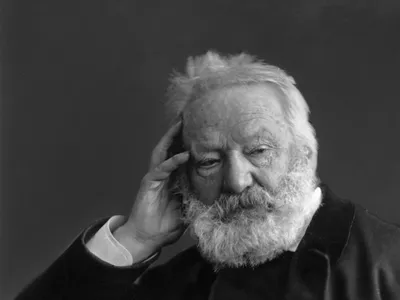Victor Hugo, born on February 26, 1802, was a renowned French poet, novelist, and playwright. Considered one of the greatest literary figures of his time, Hugo’s works, such as “Les Misérables” and “The Hunchback of Notre-Dame,” continue to captivate readers worldwide with their profound themes and timeless storytelling. Join us on a journey through the life and legacy of this iconic literary genius.

Biography Of Victor Hugo
| Title | Description |
|---|---|
| Full Name | Victor Marie Hugo |
| Birth Date | February 26, 1802 |
| Death Date | May 22, 1885 |
| Nationality | French |
| Occupation | Writer, Poet, and Playwright |
| Notable Works | Les Misérables, The Hunchback of Notre-Dame, and Toilers of the Sea |
| Education | Studied Law at the University of Paris |
| Political Leanings | Initially a Royalist, later became a Republican |
| Achievements | One of the greatest French writers, influential in the Romantic literary movement, known for his social and political activism |
| Notable Quotes | “To love beauty is to see light.” |
Early Life Of Victor Hugo
Victor Hugo Biography was born on February 26, 1802, in Besançon, France. He was raised in a family of artists and intellectuals, which greatly influenced his upbringing and creative pursuits. At the age of 13, Hugo’s family moved to Paris, where he would spend the majority of his life. In the bustling artistic and cultural capital, he was exposed to a diverse range of influences, from literature to politics, that would shape his future career as a renowned writer and social activist. Despite facing financial difficulties in his early years, Hugo’s passion for literature and his unwavering determination propelled him to become one of the most influential figures in French literature and a champion for human rights.
Family Details About Victor Hugo
| Parents | Siblings |
|---|---|
| Father: Joseph Léopold Sigisbert Hugo | Siblings: Abel, Eugène, Léopoldine, Charles, François-Victor, Adèle, and Victorine |
| Mother: Sophie Trébuchet |
Victor Hugo was born to Joseph Léopold Sigisbert Hugo and Sophie Trébuchet. He had several siblings, including Abel, Eugène, Léopoldine, Charles, François-Victor, Adèle, and Victorine. His father, Joseph Hugo, was an officer in the French army, and his mother, Sophie Trébuchet, was a socialite and artist. The influence of his parents and the unique dynamics with his siblings would later shape Victor Hugo’s life and literary career.
Victor Hugo, one of the most influential French writers of all time, had an intriguing romantic life. Let’s take a look:
Victor Hugo is currently married to Adèle Foucher. They tied the knot on October 12, 1822.
Adèle Foucher was the childhood friend of Victor Hugo, and their friendship blossomed into love. They had known each other since their early years and shared a deep connection. Adèle was known for her intelligence and beauty.
Victor Hugo had some previous relationships before his marriage to Adèle Foucher. Here is a table listing the significant others in his life:
| Name | Relationship Period |
|---|---|
| Eugénie Loyer | 1815 – 1817 |
| Louise Bertin | 1822 – 1828 |
| Julia Daudet | 1862 – 1870 |
Although these relationships were significant in different periods of his life, it was ultimately with Adèle Foucher that Victor Hugo found his true love and partner.
Career, Achievements And Controversies
Victor Hugo was a French poet, novelist, and dramatist. He became famous through his literary works that played an important role in the Romantic movement. Hugo’s career started in the early 1800s when he began publishing volumes of poetry. In 1831, he achieved widespread fame with his novel “The Hunchback of Notre-Dame,” which brought him critical acclaim and commercial success.
Victor Hugo’s notable works include novels like “Les Misérables,” “Toilers of the Sea,” and “The Man Who Laughs.” These novels depicted social and political issues of the time, highlighting the struggles of the poor and oppressed. Hugo’s writings had a profound impact on society and helped shape public opinion on various issues.
- Hugo was honored with the French Academy’s highest literary award, the “Grand Prix de Littérature,” in 1862.
- In 1870, he received a national tribute for his immense contribution to French literature.
- Hugo was also appointed to the Belgian Royal Academy in 1845.
- One of the major controversies surrounding Victor Hugo was his political activism. He openly opposed Napoleon III and his authoritarian regime, which resulted in his exile from France for almost two decades.
- Hugo’s novel “Les Misérables” faced criticism from some conservatives who saw it as promoting revolutionary ideas and portraying the Church in a negative light.
- His personal life also raised controversies, including his extramarital affairs and unconventional relationships.
FAQ About Victor Hugo
1. Who Was Victor Hugo?
Victor Hugo was a renowned French poet, novelist, and dramatist of the 19th century. He is widely considered one of the greatest writers in French literature.
2. What Are Some Notable Works By Victor Hugo?
Some of Victor Hugo’s most notable works include:
- “Les Misérables” (1862)
- “The Hunchback of Notre-Dame” (1831)
- “Ninety-Three” (1874)
- “Toilers of the Sea” (1866)
3. When Was Victor Hugo Born And When Did He Die?
Victor Hugo was born on February 26, 1802, in Besançon, France. He passed away on May 22, 1885, in Paris, France.
4. What Is Victor Hugo Best Known For?
Victor Hugo is best known for his epic historical novel “Les Misérables,” which explores themes of social injustice, redemption, and love. This work has been widely adapted into various forms, including musicals and movies.
5. Did Victor Hugo Have Any Political Involvement?
Yes, Victor Hugo was actively involved in politics and held strong republican beliefs. He served as a senator and was a staunch supporter of democracy and social progress.
6. What Was Victor Hugo’s Impact On French Literature?
Victor Hugo played a significant role in the Romantic literary movement and heavily influenced the development of French literature. His works explored complex themes and his use of vivid imagery and poetic language revolutionized storytelling.
7. Did Victor Hugo Receive Any Awards Or Recognition For His Work?
Yes, Victor Hugo received several awards and recognition during his lifetime, including being elected to the Académie Française, the highest honor in French literature. He also received numerous other literary accolades.
8. Can You Visit Any Places Associated With Victor Hugo?
Yes, there are several places associated with Victor Hugo that can be visited. Some notable sites include his house in Guernsey, the Victor Hugo Museum in Paris, and the Victor Hugo House in Besançon.
